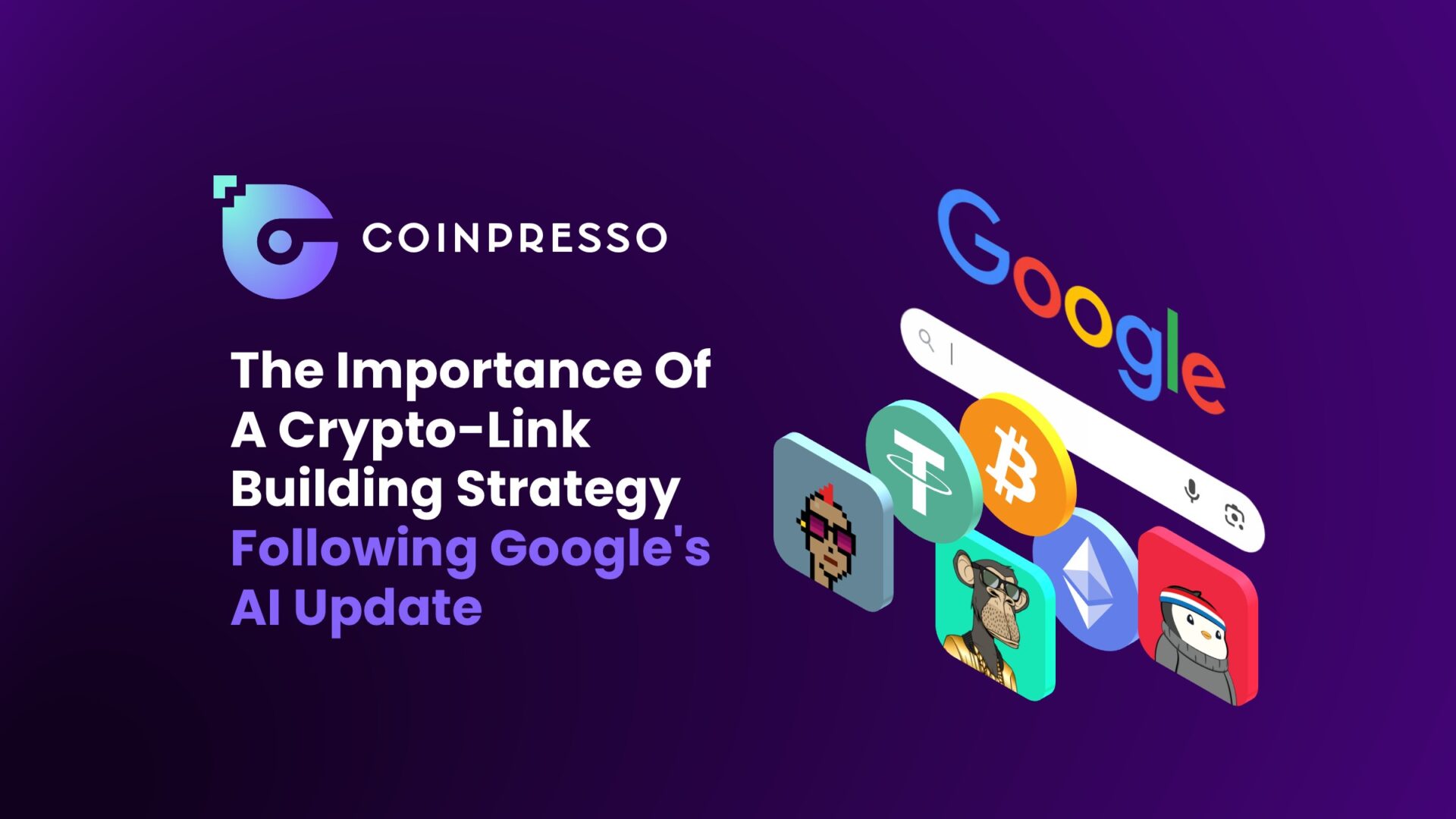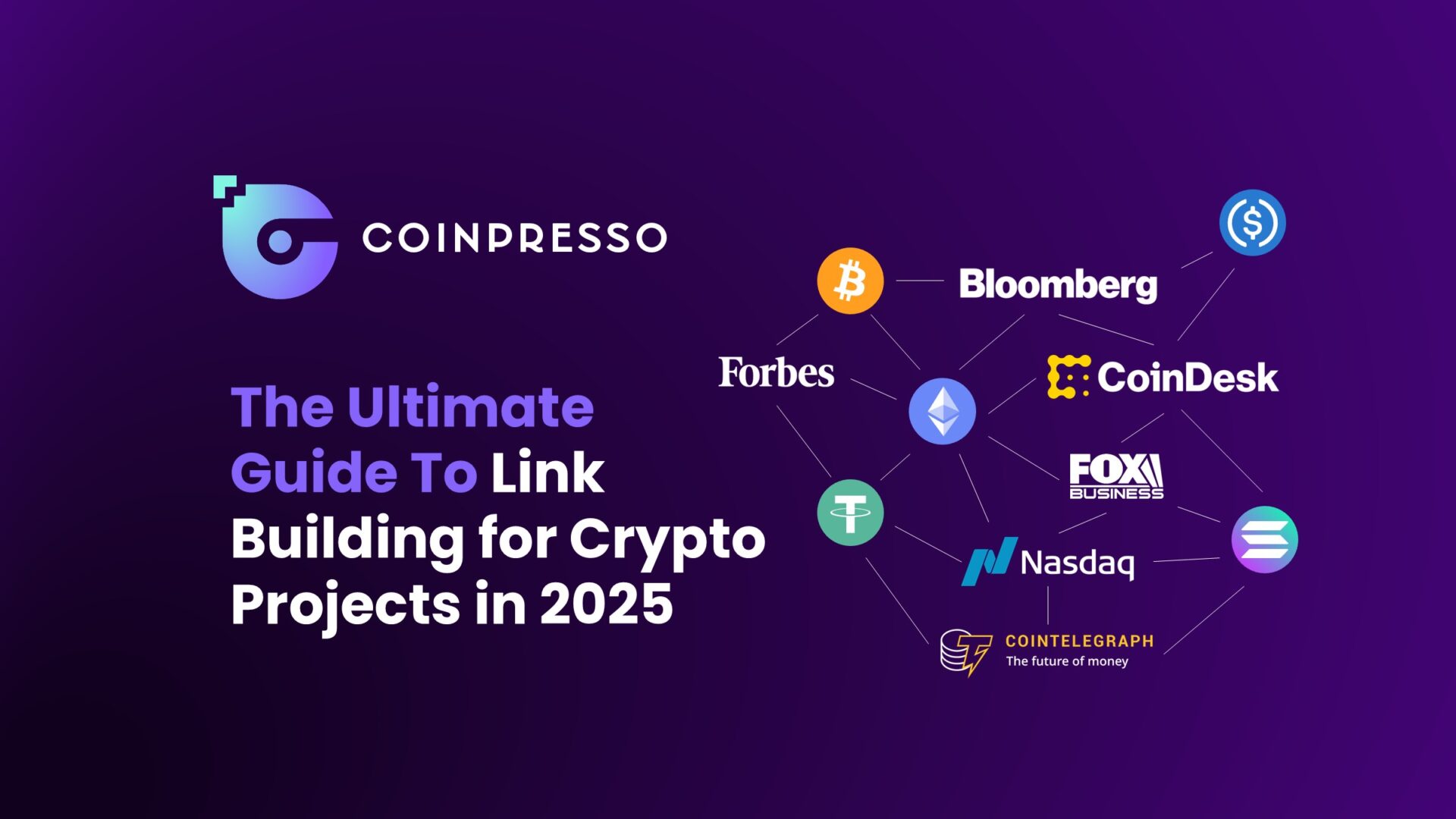
Search engines have cemented themselves as one of the primary sources of information since the inception of the internet. The cryptocurrency vertical in particular has a vehement reliance on search engines when it comes to end users fetching info. But what is Crypto SEO? How can you implement an effective SEO for crypto strategy, and what are the common myths and misconceptions? This comprehensive, no-strings-attached guide has been formulated to help you navigate the quagmire that is organic search.
If you want to save yourself reading, and hundreds/thousands of hours of work, then feel free to book a strategy session with our Crypto SEO experts. Otherwise, get ‘stuck in’ to the below guide!
1. What is SEO for Crypto?
Put simply, Crypto SEO is the optimization process of a crypto website, combining the three pillars of SEO, (On-page, Off-page, Content) and aligning the aforementioned pillars to the cryptocurrency vertical in order to attract ideal end users. The overall objective is to rank for as many relevant, converting keywords as possible - by attracting a higher clickthrough rate (CTR) on a keyword-by-keyword basis.
That might seem like a complicated concept to get your head around, but don’t worry. We will break it down over the course of this guide. Just remember those three pillars for now, as they have a resounding importance to cryptocurrency SEO strategies.
2. Why It’s Important To Conduct Cryptocurrency Search Engine Optimization
The importance of SEO for cryptocurrency projects really is without limits. A Coinpresso client recently reached $16 Million USD of weekly revenue attributed to paid search, after years and years of testing and implementing. Sounds great, right? Well, it needs to be said that this client has a 20 person SEO team alone, and utilized us for just one section of their 1 million page website. The results however, when the strategy bears fruit, are truly incredible. Here are some specific reasons as to why Crypto/blockchain SEO is important.
Increase Revenue
Probably the most important point. Everyone is ultimately looking at ROI, and over time, SEO provides one of the best ROI-yielding marketing strategy implementations possible. However, this is by no means a day one thing - and should be looked at with 12-24 months plus in terms of strategy duration, and subsequent results. Any crypto marketing agency that is looking to sell you search engine optimization services on the basis of specific timeframes and guidelines such as: “After 3 months you should be ranking position X” - should be avoided like the plague. It’s just blatant mis-selling, as Google and specifically organic search - doesn’t work in this fashion.
With Search Engine Marketing, or Crypto SEM for short, ROI-based hypothesis calculations can be provided, as day one clicks are achieved, but for SEO strategies it just doesn’t work this way. If you’re looking at using a cryptocurrency SEO agency, then the strategy should be fulfilled on an “under promise, over deliver” basis.
Back to the point at hand, the increase in revenue that SEO can provide in this vertical, can be in the hundreds of thousands, or even millions in additional topline $. But you must trust the process, and give the strategy time to mature.
Moreover, once your cryptocurrency website ranks organically, every click to your website is free. Something that cannot be boasted by Pay-Per-Click (PPC) models such as SEM or SMM for Crypto.
Attract New Users
This is strictly aligned with the revenue piece. If you are not driving new users to the top of your funnel, your project will most likely die. Whether it's an exchange, play-to-earn game, or DeFi protocol - new users are a currency in themselves. Think back to when you first got into cryptocurrency.
Your journey most likely started with a google search, “What is Coin A” for example, right? New users are absolutely no different. Google will fetch and render content that is most relevant to the search query. Hence why content is an important pillar, but again, more on that later.
To put it succinctly, new users for any product will typically start their journey with a search engine query. Capturing that intent by utilizing SEO is a more-than-viable method to convert these potential new users to your crypto or blockchain project.
Staying Relevant
Relevance is one of the most important metrics when it comes to Crypto SEO strategies. What’s the point in publishing a 2000 word blog about a new product launch, if nobody is able to read it as it’s in the depths of Google?
UX and product are of course vitally important, but optimizing blogs or content in line with user queries is how you drive organic traffic. “How to buy coin X” blogs are brilliant for decentralized and centralized exchange SEO strategies as there is a high level of relevance, whilst also retaining a genuine conversion potential. People will search how to buy something, if they’re looking to buy it. Sounds obvious, but isn’t utilized by all projects that could do so.
Providing relevant content that satisfies a user query is the epitome of SEO. If your content is relevant, Google will fetch and render that content over another piece that has 1000 more backlinks. If it’s majorly relevant, Google will even add natural markup to your content to help it rank higher too. Content really is king (or Queen, whichever way you’re inclined).
Driving traffic to your content pages, and then having effective CTAs and redirects to integration pages - is a good strategy to combine the best of both worlds.
Increase Success Of Wider Marketing Funnel
The halo effect on wider marketing provided by a good Crypto SEO strategy is oftentimes understated. Think about it.
You’re running an ads campaign. A user sees your ad, has a look around, but then doesn’t convert and ultimately bounces. That’s not to say your ads are not effective, it's just the average attention span one user may have.
If they then go to convert a few days later, can’t find your ad, and search Google for something of relevance to what they saw - and subsequently can’t find you - you just lost a customer, and most likely, gave them to a competitor that does focus on search engine optimization. Having increased visibility, for both branded and organic keywords, helps to increase your wider funnel ROI.
3. How To Conduct Successful SEO For Crypto Projects?
Quite the question. This needs to be broken down considerably in order to have a basic level of understanding. The key points are: The Three Pillars of SEO, Keywords/Keyword Research, Site Structure, Content, Technical, Backlinks, E-E-A-T (formerly E-A-T), CMS/Website Technology.
Let’s go into each point, one at a time.
The Three Pillars of SEO: On-page, Off-page, Content
An understanding of the three pillars, and how they should be effectively intertwined, is crucial to any blockchain SEO strategy. Here are the three pillars explained.

On-page
On-page is exactly as it says on the tin. Anything on your website that is helping/preventing your website from ranking. This includes, but is not limited to; Canonicals, core web vitals, URLs, site structure, and an abundance of wider technical SEO implementations. On-page should be catered for at the very start of the strategy, usually in the form of an SEO audit carried out by an SEO specialist, not a “free audit” conducted by a crawler, with no interpretation of the data.
Off-page
Off-page implementations take place away from your website. These include; backlinks, citations, directories, guest posts, link outreach - and more. Off-page contributes to the lion's share of an SEO strategy and any subsequent increase in traffic, as it requires the most time - typically daily - looking for and building links.
Content
I’ll say it again; content is king. Without effective content, your strategy will not generate the required level of traffic. Content comes on-page and off-page too. Your landing pages and blogs should be optimized, plus your off-page content, should be optimized in line with your keyword research and target keywords - on a page-by-page basis. You should look to regularly update and increase the number of pages on your website, in line with industry trends and data.
The three pillars will be referred to throughout this guide, and should be at the forefront of your SEO or blockchain digital marketing strategy - as they are key factors in driving traffic.
Keywords/Keyword Research
The essence of cryptocurrency SEO is within effective, relevant keyword research. You’ll probably have noticed the word ‘relevance’ features extensively throughout this guide. It’s definitely a conscious use of the word.
A relevant keyword with lower volume, but high conversion potential, I would take every day of the week, over a keyword that has volume, but doesn’t show ability to convert. During the length of time I’ve been running Coinpresso, I've noticed that our 0 search volume keyword variations tend to bring in the biggest clients and ROI. We understand the vertical, and as a result, can identify the best converting long-tail keywords. I’d estimate that 0 search volume keywords have brought in over $500k in sales volume for us alone. Traffic is important, sure, but the relevance of that traffic is the ultimate metric at play.
Volume isn’t everything. Relevance is everything.
Moreover, understanding the cryptocurrency vertical is absolutely critical to carrying out effective keyword research. Being a crypto trader and/or enthusiast is vital in order to understand the psyche of your ideal end user personas. What will they search for? What page within the site structure is relevant to that search? Questions that can only be answered by cryptocurrency natives, and a reason as to why standard digital marketing agencies cannot effectively carry out SEO for crypto companies.
If you don’t understand how slippage works, how to identify rugpull projects, or how liquidity pools work - you have no chance of ranking a crypto site.
Site Structure
This is a big one. The amount of websites we see that are handicapped from the outset by a poor site structure is genuinely astounding. A lack of SEO-mindfulness by developers is prominent in the cryptocurrency vertical, as there is a general lack of SEO knowledge/awareness industry-wide.
A parallax (one page) website that has clickable tiles for different sections - will not rank. A website with a lack of pages within its site structure - will not rank. I’ll say it again, content is king (or queen) and without having a proper site structure conducted in line with a silo-ing report, will see that the site is detrimented from the outset.
But what is silo-ing? Ultimately, it's the assignment of individual pages and blogs in line with their search queries. This then ensures that the content for each page is relevant, while not cannibalizing other pages. Each page should have its own, independent purpose, as part of a harmonious site structure - in line with target keywords.The page type is important too. If a keyword search is informative by nature, then blogs will stand a better chance of ranking vs landing pages, as Google fetches and renders content in this fashion. If it's a product with a transactional intent, then it’s most likely going to be vice-versa to this rule of thumb. If your site has good silo-ing, then traffic should generally be positively affected. Intent is key to site structure.
Tech Issues
Technical SEO issues plague crypto sites. From the simple to the more complex, tech issues are typically addressed at the very start of any SEO services, as they can constrain traffic - but also inhibit User Experience.
Some common technical issues:
- Canonicalization. Do your canonicals point to the correct site version?
- Duplicate content. Is your site duplicating your own - or worse still - another site's content? This is a big no-no as far as SEO, or even the realms of basic decency are concerned. Content should be original, and optimized in line with content recommendations and a meta mapping file.
- Poor Mobile core web vitals/experience. Has your website been built with an excessive amount of javascript, with no mindfulness for mobile devices? Chances are, Google has noticed and will inhibit your rankings as a result.
- Messy URLs. Does your URL slug succinctly say what the page is all about, without fluff, while being optimized for a keyword or two? Do URLs have the correct path, and belong to the correct category/product pages?
- Poor navigation. Got pages on your website that aren’t included in your main-nav? They won’t be as visible, will attract a lower clickthrough rate, and Google will see them as less relevant than other pages. Rankings will suffer as a result.
- Slow page load speed. Load speed is consistently neglected by crypto website developers, as they focus more on making the page look flashy than they do with how it loads (generally speaking). Site load speed, and specifically, core web vitals - became a ranking factor in May 2022. Moreover, if a page takes 20 seconds to load, who is going to trust it, and in turn, use or transact with it? Page speed subconsciously affects a user's confidence in that page or product.
- Poor Quality/Irrelevant/Shady Links. Will cover this in full in the next section.
Backlinks
Link building - when carried out effectively - is proven to be a major implementation when it comes to driving rankings and traffic. But, as alluded to just now, the quality of said backlinks, and how they are built - is of paramount importance.
Engaging in shady link building practices, like building unnatural, spammy links - will generally yield little-to-zero results.
The irony is, pretty much every link building tactic is somewhat a violation of Google’s webmaster guidelines. It’s how you go about building that determines what side of the fence you are on.
For example; paying for a backlink = not ok.
Paying for a piece of content, and having one link included for free with the content = generally ok.
But links alone aren’t enough. The links need to be relevant, built from websites that are similar to yours in nature. Crypto sites should have a higher volume of crypto-specific links than general links. The type of link is also very important. Generally speaking, anchor texts optimized for your target keywords, mapped to the pages that are most relevant as per your silo-ing report - is the best practice.
With that being said, a variety of links should make up a link profile. One of the most common BS pieces within SEO is:
“We will build lots of high authority backlinks to help increase your domain rating.”
If anybody is saying this to you, and claiming to be an SEO expert, run for the hills. A diverse link profile is what’s required, not one that’s been juiced out with lots of high authority domains. The minute that Google catches you juicing your link profile in this fashion, straight to Google jail, do not pass go, do not collect $200 - otherwise known as an algorithm penalty.
Having a variety of different authority, links, and referring domains is really important to maintaining a healthy link profile. While we are on that subject, referring domains are the key metric behind a link profile - not backlinks. I would rather have 100 unique links from 100 different referring domains, than 10 links a piece across 10 referring domains.

And finally, it's that word ‘relevance’ again. Topical relevance is the most important factor when it comes to link building. Think about it, if I say you’re good at golf, ok, but I’m rubbish at golf. I am not topically relevant to the sport of Golf. If Tiger Woods says you’re good at golf, you’re good at golf. He is a relevant, subject matter expert in Golf and possesses major authority in the sport. Link building works in exactly the same way.
Have a good link profile, with a variety of links and referring domains, optimized for target keywords - traffic should generally increase over time. But it’s not a guarantee. Nothing in SEO, is guaranteed
E-E-A-T (Formerly E-A-T)
Every so often, Google will decide to ‘rug’ you and roll out a core algorithm update, that pretty much rubbishes previous work. This is an extreme scenario, but it's very much part of the SEO playbook. E-E-A-T was a major update rolled out in 2022, but what does it mean?
- Experience (New)
- Expertise
- Authoritativeness
- Trust
Previously, experience wasn’t part of the algorithm, however with the update - the author’s/publisher's relevant experience in that field now paves into how trustworthy Google sees that content. So not only do you need to have experience, and write from a position of authoritativeness, while maintaining trust - you also need to have experience as a subject matter expert.
On a basic level, it should be clear to Google who owns the website, who published the content, and what their relevant experience is. There’s a great guide from Search Engine Land available which goes into this in greater detail, but the effect the update had on content across the board was pretty staggering.
Choosing The Right CMS/Website Technologies
Majorly important. An Angular website that features excessive amounts of Javascript, will most likely never rank. Using either a CMS, or a framework that has a mindfulness for SEO - ultimately determines your success at the development level.
As a best practice, an SEO-friendly CMS should be adopted, period. Wordpress or Webflow are most commonly used and optimized for SEO. There’s a reason that 33% of the world’s websites are Wordpress sites, as they have a structure that allows for content to be fetched and rendered easily.
“But what about our integrations!?” - I hear you say. Well, work on the directory level. Have your main content pages on a CMS, while your key integrations, such as crypto staking platforms - as separate directories on React - for example. Wordpress and React can work together in this fashion. It doesn’t have to be do-or-die either way, and any good web developer should be able to implement at the directory level, to help increase both the UX and indexability of content.
4. How To Track Success of Crypto SEO
Being able to track performance of any marketing campaign is of obvious importance. The difference with SEO, is the need to do it with honesty and integrity, with clear, reasonable objectives that span over a long period of time.
It comes first-and-foremost how the solution is sold or implemented. As mentioned before, promises of rankings based on time should be avoided every day of the week. Having a rational and honest discussion as to how results will be seen over periods of in excess of 1 year in length, yield the best results and satisfaction for both the SEO team and the client and/or website.
In terms of tracking, the usual metrics come into play, and they definitely shouldn’t be avoided, despite there being a need to treat each with honesty:
- Rankings
- Traffic
- Clicks
- Impressions
- Traffic Acquisition
- Goal/Conversion Tracking
Any SEO or digital marketing agency as a whole should be able to showcase their results on a monthly basis. If there’s a downturn in traffic - that’s ok! SEO is not an exact science where continuous uptrends are seen. It’s all about zooming out, exactly as with a crypto price chart. Zoom out over a long sample period, to genuinely see the effects/any increase in traffic - not between months 1-6 of project launch, or SEO implementation. An SEO plan should be just that - a plan - over a good sample size to effectively evaluate results.
5. Common Crypto SEO Misconceptions & Myths
As with any element of a digital marketing funnel or strategy, there are a bunch of myths that come along in tandem. Here are the most common ones:
“Any Standard Digital Marketing Agency Can Do Crypto SEO”
Complete and utter rubbish. A Web 2 digital marketing agency is most likely great at implementing strategy for builders and plumbers, but cryptocurrency/blockchain projects are a different vertical, and a different beast entirely.
If they cannot understand the user persona, then a lot of the cut-through of the strategy is lost too. SEO is ultimately about aligning your website to the ideal end user, and if your Web 2 digital marketing folks don’t understand the vertical - your strategy will be at detriment. Keyword research, link building, content creation, should all be undertaken by cryptocurrency experts, as well as SEO and content experts.
“But I Can Get Cheap SEO From Fiverr?”
This myth co-exists within traditional digital marketing, and crypto marketing. It’s a myth on both sides of the fence. Cheap SEO, means rubbish results.
“We Can’t Update The Website, But Still Expect Results From SEO.”
Remember those three pillars? In order to increase traffic, all pillars must be incorporated in a tripartite fashion. SEO, Content Team, and Developers, should all be working in tandem with the common goal of seeing a tangible increase in rankings and traffic over time.
If one of those pillars, or the person in charge of that pillar so to speak - is slacking - this drops the ball for the entire team. It’s physically impossible to attain results from SEO, without a web developer that is 100% focused on achieving advice and implementation requests of the SEO team. Sometimes an SEO team can do implementations for you, but it needs to come with a mandate and subsequent permission to make those changes from the website owner.
If you’re undertaking an SEO project and aren’t expected to drive your team to implement the findings, don’t expect an increase in traffic or rankings.
6. Conclusion
There you have it! You should now be equipped with enough basic knowledge to undertake your own crypto SEO strategy, or have realized the sheer amount of testing, implementation, and content required to create an SEO strategy. If it’s option 1 for you - awesome! Tell us about your results and how you utilized this guide on SEO for crypto projects by tagging our social handles, and providing feedback:
If you’re looking to utilize some expert support for your Crypto SEO strategy, then contact us today for a strategy session, and to get some starter keyword research and technical analysis.



































